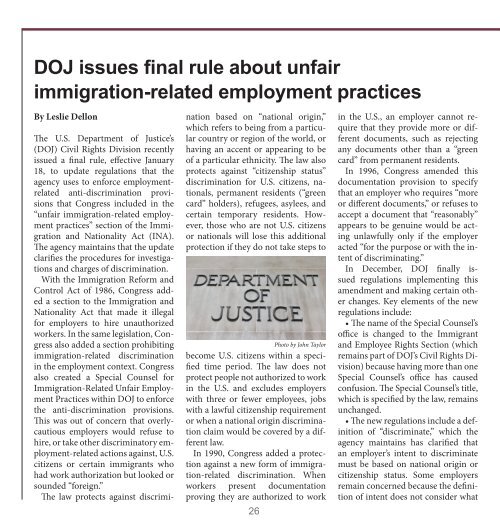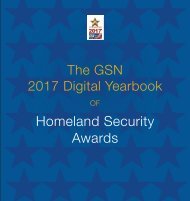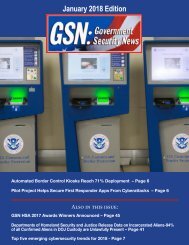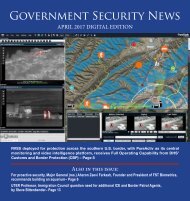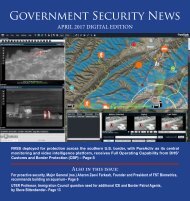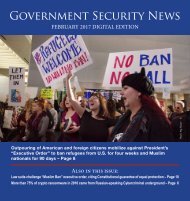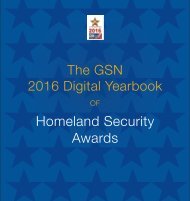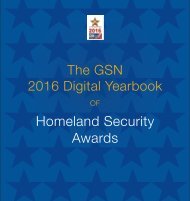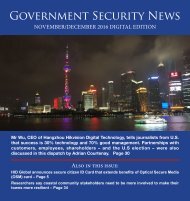Government Security News January 2017 Digital Edition
Government Security News January 2017 Digital Edition. Available on the GSN Magazine Website at www.gsnmagazine.com
Government Security News January 2017 Digital Edition. Available on the GSN Magazine Website at www.gsnmagazine.com
Create successful ePaper yourself
Turn your PDF publications into a flip-book with our unique Google optimized e-Paper software.
DOJ issues final rule about unfair<br />
immigration-related employment practices<br />
By Leslie Dellon<br />
The U.S. Department of Justice’s<br />
(DOJ) Civil Rights Division recently<br />
issued a final rule, effective <strong>January</strong><br />
18, to update regulations that the<br />
agency uses to enforce employmentrelated<br />
anti-discrimination provisions<br />
that Congress included in the<br />
“unfair immigration-related employment<br />
practices” section of the Immigration<br />
and Nationality Act (INA).<br />
The agency maintains that the update<br />
clarifies the procedures for investigations<br />
and charges of discrimination.<br />
With the Immigration Reform and<br />
Control Act of 1986, Congress added<br />
a section to the Immigration and<br />
Nationality Act that made it illegal<br />
for employers to hire unauthorized<br />
workers. In the same legislation, Congress<br />
also added a section prohibiting<br />
immigration-related discrimination<br />
in the employment context. Congress<br />
also created a Special Counsel for<br />
Immigration-Related Unfair Employment<br />
Practices within DOJ to enforce<br />
the anti-discrimination provisions.<br />
This was out of concern that overlycautious<br />
employers would refuse to<br />
hire, or take other discriminatory employment-related<br />
actions against, U.S.<br />
citizens or certain immigrants who<br />
had work authorization but looked or<br />
sounded “foreign.”<br />
The law protects against discrimination<br />
based on “national origin,”<br />
which refers to being from a particular<br />
country or region of the world, or<br />
having an accent or appearing to be<br />
of a particular ethnicity. The law also<br />
protects against “citizenship status”<br />
discrimination for U.S. citizens, nationals,<br />
permanent residents (“green<br />
card” holders), refugees, asylees, and<br />
certain temporary residents. However,<br />
those who are not U.S. citizens<br />
or nationals will lose this additional<br />
protection if they do not take steps to<br />
become U.S. citizens within a specified<br />
time period. The law does not<br />
protect people not authorized to work<br />
in the U.S. and excludes employers<br />
with three or fewer employees, jobs<br />
with a lawful citizenship requirement<br />
or when a national origin discrimination<br />
claim would be covered by a different<br />
law.<br />
In 1990, Congress added a protection<br />
against a new form of immigration-related<br />
discrimination. When<br />
workers present documentation<br />
proving they are authorized to work<br />
26<br />
Photo by John Taylor<br />
in the U.S., an employer cannot require<br />
that they provide more or different<br />
documents, such as rejecting<br />
any documents other than a “green<br />
card” from permanent residents.<br />
In 1996, Congress amended this<br />
documentation provision to specify<br />
that an employer who requires “more<br />
or different documents,” or refuses to<br />
accept a document that “reasonably”<br />
appears to be genuine would be acting<br />
unlawfully only if the employer<br />
acted “for the purpose or with the intent<br />
of discriminating.”<br />
In December, DOJ finally issued<br />
regulations implementing this<br />
amendment and making certain other<br />
changes. Key elements of the new<br />
regulations include:<br />
• The name of the Special Counsel’s<br />
office is changed to the Immigrant<br />
and Employee Rights Section (which<br />
remains part of DOJ’s Civil Rights Division)<br />
because having more than one<br />
Special Counsel’s office has caused<br />
confusion. The Special Counsel’s title,<br />
which is specified by the law, remains<br />
unchanged.<br />
• The new regulations include a definition<br />
of “discriminate,” which the<br />
agency maintains has clarified that<br />
an employer’s intent to discriminate<br />
must be based on national origin or<br />
citizenship status. Some employers<br />
remain concerned because the definition<br />
of intent does not consider what


